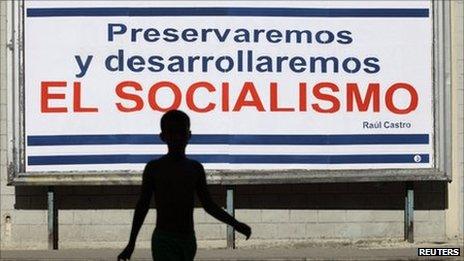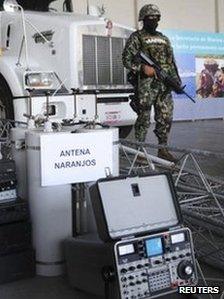Barack Obama says Cuba's reforms not aggressive enough
- Published

Raul Castro's aim: Preserve and develop socialism
Recent changes in Cuba have not been "aggressive enough" to open its economy or reform its political system, US President Barack Obama has said.
Mr Obama, speaking to Spanish-language correspondents in Washington, said Cuba remained a "throwback" to the 1960s.
Cuba, under a US economic embargo for nearly five decades, has this year moved towards some economic opening.
Asked about Mexico's drugs conflict, Mr Obama said President Felipe Calderon was right to take on the cartels.
President Obama said the Cuban authorities had indicated they wanted to make changes to allow businesses to operate more freely.
But, he said, there was no evidence that they had been sufficiently aggressive in doing this.
"And they certainly have not been aggressive enough when it comes to liberating political prisoners and giving people the opportunity to speak their minds", Mr Obama said.
Cuban President Raul Castro has been introducing some changes including allowing Cubans to work for themselves.
The Cuban government this year also freed the last of 75 dissidents jailed during a crackdown on dissent in 2003.
But Mr Obama put the situation in Cuba in the wider international context.
"You are seeing enormous changes taking place in the Middle East just in the span of six months, you are seeing there are almost no authoritarian communist countries left in the world, and here you have this small island that is a throwback to the 60s."
Mexico's challenge
President Obama has moved to ease restrictions on Cuban-Americans travelling to the island but a gradual thaw in ties has been disrupted by the imprisonment of a US contractor.

Mexican authorities regularly display equipment seized from traffickers
The US has repeatedly demanded the release of Alan Gross, who is serving a 15-year jail sentence for bringing illegal satellite equipment into Cuba.
For its part, Havana regularly calls for five Cubans jailed for spying in Florida to be released.
In the interview, President Obama rejected the argument that Mexico should try to find some kind of accommodation with drug gangs as a way of ending the bloodshed.
"I don't think Mexican people want to live in a society where drug kingpins are considered to be some of the more powerful individuals in society," Mr Obama said.
Peace could not be achieved by negotiating with people without scruples or respect for human life, Mr Obama said.
In his view, President Calderon had taken a courageous decision to tackle the cartels.
"I believe that, as difficult as this time is, ultimately Mexico will be stronger if it does not give in," Mr Obama said.
Some 40,000 people have died in drug-related violence since Mr Calderon began deploying troops against the drug gangs in late 2006.
- Published2 August 2011
- Published30 August 2011
- Published12 July 2011
- Published2 September 2011